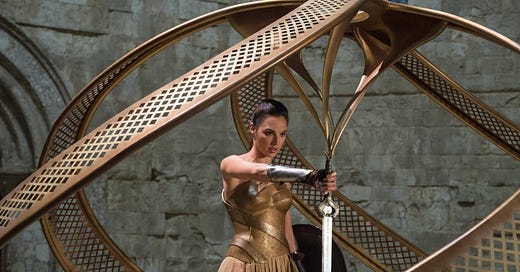The Magical Sword That Was Never Magical
From Wonder Woman to Star Wars to Harry Potter to Arthur, the same lesson resurfaces. And it always includes a magical sword that isn't quite magical enough in the end.
The Magical Sword That Was Never Magical
Every hero needs a sword.
Or at least, that’s what they think.
Let’s start with a story you might have missed if you didn’t see the 2017 movie Wonder Woman.
Diana is an Amazon—raised on the hidden island of Themyscira, trained from childhood to be a warrior. She believes her purpose is to defeat Ares, the god of war. Before she leaves her home to join the world’s fight against tyranny, the Amazons give her an ancient blade called the Godkiller. Everyone believes it’s the only weapon strong enough to destroy a god.
Throughout her journey, Diana clings to this sword as her hope. It represents her destiny, her power, her chance to save humanity.
But when she finally faces the god Ares in battle, something unexpected happens.
He easily shatters the sword in front of her.
And then he says:
"That sword was not the Godkiller. You are."
The blade never had any real power to match her enemy’s might.
But she did. All along.
If you’ve watched Star Wars, you’ve seen this pattern too.
Luke Skywalker meets Obi-Wan Kenobi, who hands him his father’s lightsaber. It hums and glows, and Obi-Wan tells him it’s “an elegant weapon.” It feels like destiny in Luke’s hand—like this is the thing that will make him strong enough to face Darth Vader.
But here’s the secret: the lightsaber was never the true power.
The real power was The Force—something already inside Luke. The lightsaber was just a way to help him believe it.
You see this again and again in stories:
King Arthur pulls Excalibur from the stone, proving he is worthy to be king. But it’s not the blade that makes him noble—it’s his heart.
In The Lord of the Rings, Frodo inherits Sting, a dagger that glows near danger. It comforts him, guides him, and makes him feel braver. But Sting doesn’t destroy the Ring. Frodo’s courage does.
Even Harry Potter’s wand—supposedly unique and powerful—is less important than the love and sacrifice that protect him.
The pattern is clear:
An emerging hero knows they can’t possibly win the battle that awaits them.
A mentor gives the hero a sword.
The hero believes the sword is the key to victory.
The hero wins the battle, but not because of the sword.
Eventually, the hero learns they had the strength inside them all along.
The Swords You’ve Been Given
If you are on your own hero’s journey, remember this:
Your mentors—whether they are teachers, coaches, bosses, or wise friends—will offer you something that feels essential. Advice. A strategy. A tool.
They aren’t just giving you a tip.
They are placing a sword in your hand because they already see what you can’t see: you have everything you need.
And it’s okay to believe the sword is magic. In fact, believing in it may give you the courage to face the dragon.
But one day, you’ll look back and realize:
You didn’t really need a sword.
You needed to believe you were enough.
For the Mentors
And if you are the old guide in the cave—the Obi-Wan, the Gandalf—remember this:
The young hero can’t yet see what you have seen.
They don’t know they’re ready.
So find a sword that fits in their hand. Give them something to trust in while they grow into themselves.
Because someday, they’ll return to tell you the truth:
The sword was never magic.
But your belief in them was.





This hit like a brick wrapped in a love letter. What if the church’s sword—its doctrines, dogmas, even its creeds—were never the real power either? What if, like Diana, we were meant to outgrow them, not discard them, but to realize they were just training wheels for the deeper knowing already within us? The Kingdom isn’t in the stone, darling. It’s in you.
This was so beautifully written! You have such an amazing gift! 😊🙏